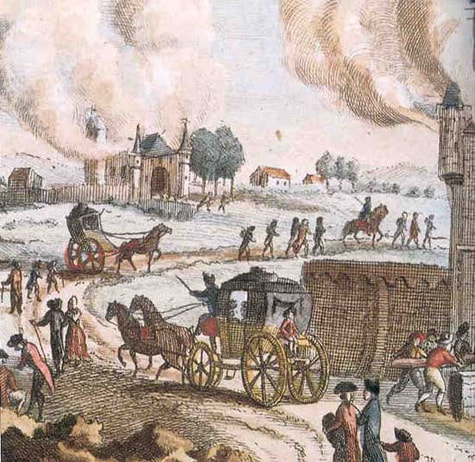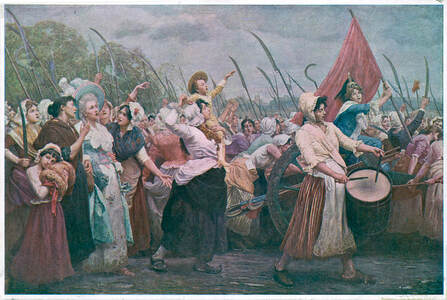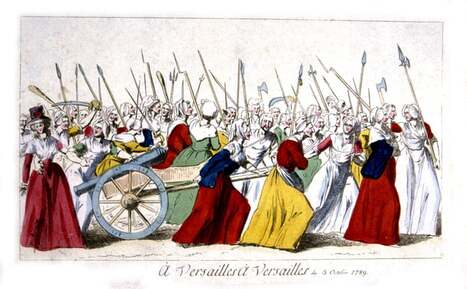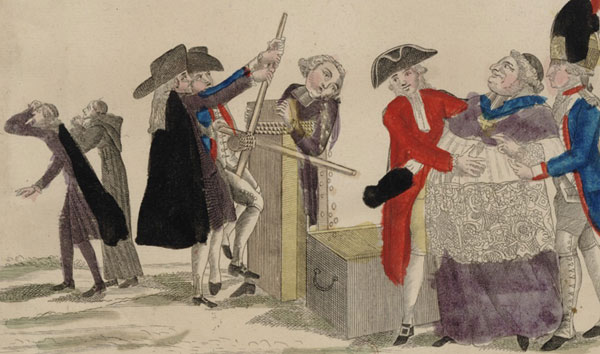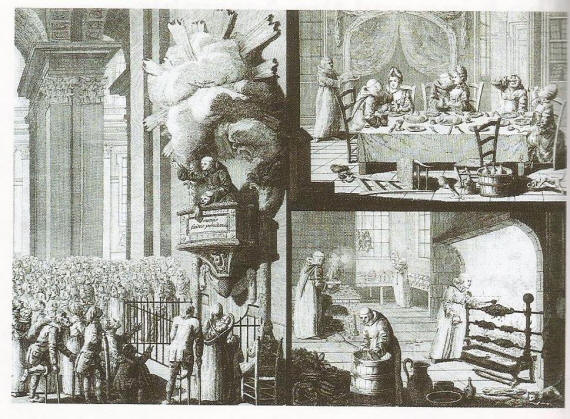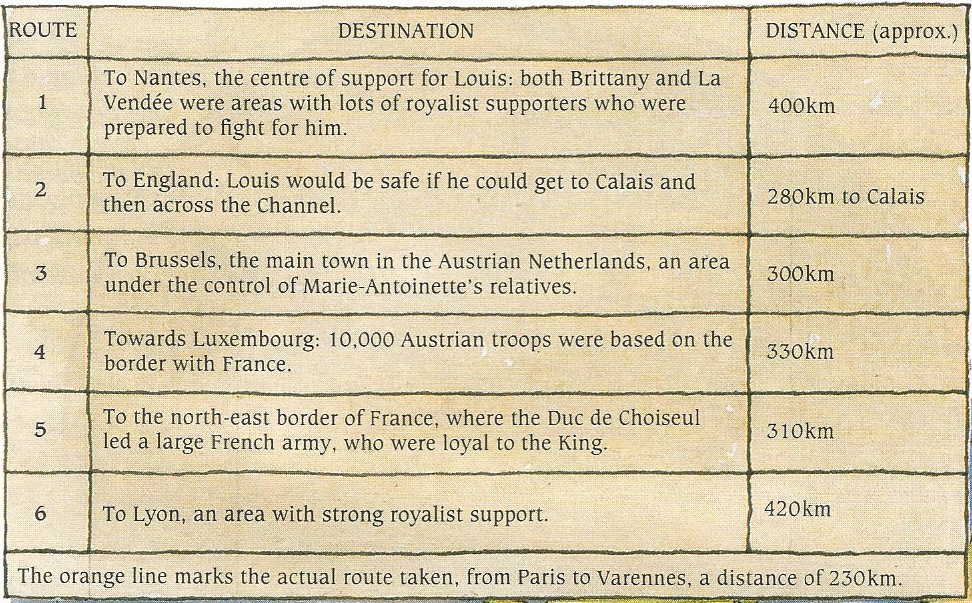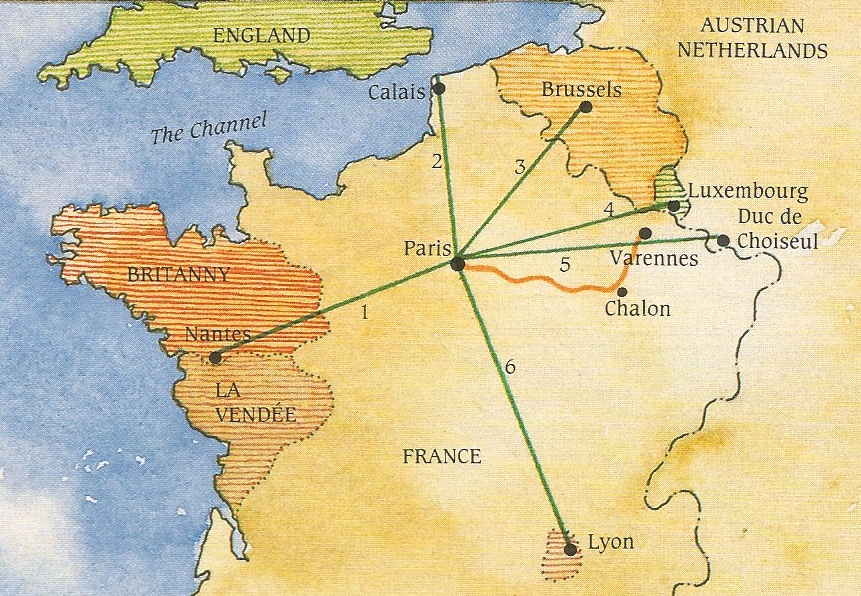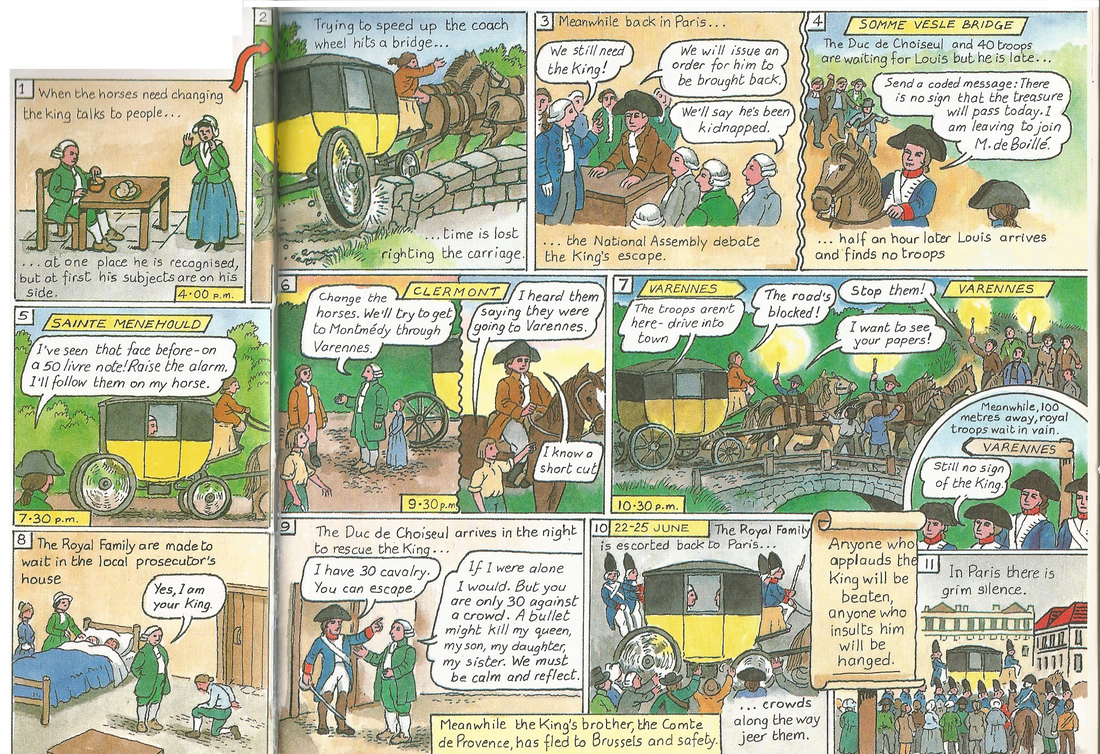Lesson 6 - How and why did the king lose control of France between 1789 and 1791?
The National Guard and the Paris Commune.
Louis XVI considered sending his army into Paris to recapture the Bastille. His war minister, however, warned him that the soldiers would probably refuse orders to do so. Louis therefore had to give up control of Paris. In July 1789 he ordered his army back to its barracks. To keep order in Paris he allowed the people to set up their own military force, the National Guard. To run the city, leading officials of the third estate formed a new local government, the Paris Commune. Towns and cities all over France followed the example of Paris. Rioting crowds attacked town halls, forced out the royal officials, and set up their own communes and National Guard units.
Louis XVI considered sending his army into Paris to recapture the Bastille. His war minister, however, warned him that the soldiers would probably refuse orders to do so. Louis therefore had to give up control of Paris. In July 1789 he ordered his army back to its barracks. To keep order in Paris he allowed the people to set up their own military force, the National Guard. To run the city, leading officials of the third estate formed a new local government, the Paris Commune. Towns and cities all over France followed the example of Paris. Rioting crowds attacked town halls, forced out the royal officials, and set up their own communes and National Guard units.
|
The Great Fear
The violence then spread into the countryside, where unemployment was high and millions were hungry. Many thousands of people had left home to seek work or to beg, and were now wandering around the countryside looking for food. Farmers lived in fear of gangs of wanderers who stole food from their fields and damaged their farms. As harvest time approached, rumours swept the countryside that nobles were trying to starve the people by hoarding grain. The rumours also said that nobles were paying the gangs of wanderers to attack farms and terrorise the peasants. Angry peasants responded to the rumours by refusing to pay their feudal dues. In many places they broke into their lords' homes and burned records of their dues. As the violence spread, fear of gangs increased. Villagers who thought they saw gangs rang the church bells to warn neighbouring villages. The warnings, passed from town to town, spread the panic to many parts of France. By late July, the whole country was gripped by a 'Great Fear'. |
The Assembly begins its work
The deputies in the National Assembly were scared by the violence of the peasants. They took drastic measures to end it. On the night of 4 August, noble deputies, one by one, announced that they would give up their feudal rights and dues. By the next morning hunting rights, tithes, the corvee, and the rights of the mill and the oven had all been abolished. Feudalism was dead.
Three weeks later, the Assembly made another important change to French society. It issued a 'Declaration of the Rights of Man and the Citizen'. This stated that all men were free and equal in rights. It said people should have the right to speak and write freely. It changed the laws of arrest and imprisonment, and banned torture. Above all, it said that power in France belonged to the entire people, not just the king.
The deputies in the National Assembly were scared by the violence of the peasants. They took drastic measures to end it. On the night of 4 August, noble deputies, one by one, announced that they would give up their feudal rights and dues. By the next morning hunting rights, tithes, the corvee, and the rights of the mill and the oven had all been abolished. Feudalism was dead.
Three weeks later, the Assembly made another important change to French society. It issued a 'Declaration of the Rights of Man and the Citizen'. This stated that all men were free and equal in rights. It said people should have the right to speak and write freely. It changed the laws of arrest and imprisonment, and banned torture. Above all, it said that power in France belonged to the entire people, not just the king.
|
The women march to Versailles (The October March)
Louis XVI disliked these decisions of the Assembly. He refused to sign them, which meant they could not become law. Then, early in October, he brought more soldiers to Versailles to add to his bodyguard. Again it looked as if he was going to break up the Assembly by armed force. When news of this reached Paris, crowds of market women gathered in the streets. They marched through the city, collecting weapons. On 5 October, armed with knives, sticks, rifles and two cannons, they marched to Versailles to protest. Supported by National Guardsmen, they complained to the king about the high price of bread and about the extra soldiers in Versailles. They asked him to leave Versailles and come with them to live in Paris. This would allow them to keep an eye on his activities. Louis did not want to go. He changed his mind when a group of the women smashed their way into his palace, killed two bodyguards and threatened to kill the queen. On 6 October Louis, Marie Antoinette and their oldest son travelled in a coach to Paris, surrounded by a crowd of 60,000 people. The Palace of Versailles was locked and boarded up. From then on they lived in the Tuileries Palace in the centre of Paris. |
Reforms of the National Assembly
The deputies of the National Assembly followed the royal family to Paris, where they took over an old riding school as a meeting place. Over the next two years the Assembly made many new laws, changing the way France was organised and run. Consider the list of reforms below? Which reforms weakened feudalism and the aristocracy? Which reforms were particularly influenced by influenced Enlightenment ideas?
The deputies of the National Assembly followed the royal family to Paris, where they took over an old riding school as a meeting place. Over the next two years the Assembly made many new laws, changing the way France was organised and run. Consider the list of reforms below? Which reforms weakened feudalism and the aristocracy? Which reforms were particularly influenced by influenced Enlightenment ideas?
Reforms of the National Assembly
|
1. Male tax-payers over 25 years old were given the right to vote.
2. All Church land was confiscated so that it could be sold to pay France's debts. 3. The Assembly paid off France's debts with bank notes called assignats: people who were owed money were given assignats with which they could buy confiscated church land. 4. Local government was re-organised. Local councils were elected by citizens. 5. Protestants were given the same voting rights as Catholics. 6. France was divided into 83 Departments, each run by an elected council. 7. Jews were given the same voting rights as everyone else. 8. The salt tax [gabelle) was abolished. 9. Most monasteries and convents were closed down. 10. Assignats became France's legal currency. |
11. Noble titles were abolished.
12. The Church was reformed: a 'Civil Constitution of the Clergy' said that bishops and priests must be elected by the people and must take an oath of loyalty to France. 13. A new system of law courts was created. Judges were to be elected by citizens. 14. The traites taxes were abolished. 15. A tax on land was introduced. 16. Trade guilds were abolished. 17. The aides taxes were abolished. 18. The taille tax was abolished. 19. Black people in French colonies were given the same rights as white people. 20. Slavery in France was abolished. 21. The Assembly introduced a constitution describing how France would be governed. |
The reform of the Church
Most people welcomed the above reforms. On one issue, however, they were divided. That was the reform of the Church. On one side of the argument were growing numbers of people who thought the Church had too much power, too much land and too much money. They also thought that many of the clergy lived unholy lives. See the contemporary images below which were critical of the church. Do you understand their meaning?
Most people welcomed the above reforms. On one issue, however, they were divided. That was the reform of the Church. On one side of the argument were growing numbers of people who thought the Church had too much power, too much land and too much money. They also thought that many of the clergy lived unholy lives. See the contemporary images below which were critical of the church. Do you understand their meaning?
On the other side were millions of God-fearing Catholics who had never questioned the way the Church was run, and who could see no reason to change it. So when the National Assembly began to take land and money from the Church, many Catholics protested. Their protests grew louder in July 1790 when the Assembly drew up a law reducing the power of the Church. The law, called the Civil Constitution of the Clergy, said that priests and bishops must be elected like other public officials. It ordered all clergy to take an oath of loyalty to the French nation and the law. Over half the clergy refused to take this oath. They said that the Assembly had no right to interfere in Church affairs. The Pope supported their protest by condemning the new law. From then on, the clergy were divided between those who took the oath and who supported the revolution, and those who refused the oath and opposed the revolution. Millions of people followed the examples set by their priests. Before long, therefore, the entire nation was divided by the question of the Church and its power.
The flight to Varennes
Louis XVI was deeply unhappy with the Civil Constitution. He sided with the priests who refused to take the oath. This made it look, yet again, as if he opposed the revolution. Angry crowds protested at the gates of the Tuileries Palace. Urged on by his wife and by members of his court, Louis now decided to leave France. Their aim was to get help from the French princes who had already left France and had built up armies just across the frontier. They also hoped for assistance from Marie Antoinette's brother Leopold, the Emperor of Austria. They would then be able to invade France, get rid of the Assembly, and take back the power they had lost. But where would they go?
Louis XVI was deeply unhappy with the Civil Constitution. He sided with the priests who refused to take the oath. This made it look, yet again, as if he opposed the revolution. Angry crowds protested at the gates of the Tuileries Palace. Urged on by his wife and by members of his court, Louis now decided to leave France. Their aim was to get help from the French princes who had already left France and had built up armies just across the frontier. They also hoped for assistance from Marie Antoinette's brother Leopold, the Emperor of Austria. They would then be able to invade France, get rid of the Assembly, and take back the power they had lost. But where would they go?
Leaving France, was far from easy. Because the Assembly suspected that Louis might try to escape, there were guards at every door in the Palace. Louis and his family therefore had to make a secret escape. Close to midnight on 21 June 1791, Louis, Antoinette and their children, all in disguise, crept out of the palace through a temporarily unguarded door. A waiting carriage then took them eastwards towards Montmedy, close to the frontier 250 km away (see map above).
They were still 50 km from the frontier when they were recognised. News of their escape was sent ahead and the local authorities were waiting for them in the little town of Varennes. They were arrested and sent back to Paris the next day. As they went, crowds shouted insults and spat at the windows.
Activity
Read the text above carefully and watch the next part of the film on the French Revolution. Then download and complete the worksheet, explaining how at each stage the king gradually lost power.
Read the text above carefully and watch the next part of the film on the French Revolution. Then download and complete the worksheet, explaining how at each stage the king gradually lost power.
|
|

